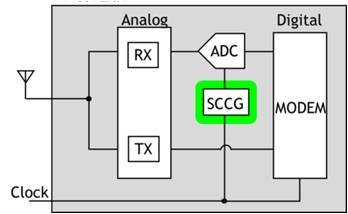Toshiba’s storing-schrappende klokgenerator herstelt sensitiviteit ontvanger van system-on-a-chip
TOKYO–(BUSINESS WIRE)– Toshiba Corporation heeft een storing-schrappende klokgenerator (spur canceled clock generator, SCCG) ontwikkeld die de sensitiviteit van draadloze verbindings-IC’s herstelt. De SCCG herstelt de sensitiviteit door storing, die ontstaat in het kloksignaal, te onderdrukken. De SCCG behaalt bij de ontvanger een sensitiviteit van -93 dBm voor alle kanalen in smart-IC’s voor Bluetooth ®. Toshiba maakt deze stap vooruit bekend op het VLSI Circuits Symposium 2016, een internationale conferentie over apparaten met halfgeleiders dat op 15 juni plaatsvindt in Honolulu, Hawaii.
Toshiba’s Spur Canceled Clock Generator Recovers Receiver Sensitivity in Wireless SoCs |
|||||
|
TOKYO–(BUSINESS WIRE)– Toshiba Corporation (TOKYO:6502) has developed a spur canceled clock generator (SCCG) that recovers receiver sensitivity of wireless connectivity IC. The SCCG recovers receiver sensitivity by suppressing the spur, interference that originates from the clock signal, and achieves receiver sensitivity of -93 dBm for all channels in Bluetooth ®Smart ICs. Toshiba will announce this advance at VLSI Circuits Symposium 2016, the international conference on semiconductor devices held in Honolulu, Hawaii on June 15. This Smart News Release features multimedia. View the full release here: http://www.businesswire.com/news/home/20160614005558/en/  Circuit diagram of wireless connectivity IC (Graphic: Business Wire) Circuit diagram of wireless connectivity IC (Graphic: Business Wire)
Recent wireless connectivity ICs integrate analog blocks, such as RF circuits, digital blocks, and mixed signal blocks, such as AD converters, on one chip. However, some of the harmonics of the reference clock signal for AD converters and digital circuits, known as clock spurs, degrade receiver sensitivity. Conventional techniques to recover sensitivity have resulted in issues with additional power consumption, chip size and development costs. Toshiba’s solution is a clock generator that suppresses spur by delaying some parts of the clock. This clock delay generates two kinds of clock spurs that have reverse phase with the same amplitude, which cancel each other out. Since the generator’s power consumption is 18μW and the size is 40μm×120μm, clock spur is suppressed without any increase in power consumption or size. This approach recovers 4dB of sensitivity degraded by the spur, and applied to Bluetooth ® Smart IC achieves -93dBm receiver sensitivity. The spread of such applications as wearable devices is boosting demand for wireless connectivity ICs. Toshiba will proactively continue to expand its line-up of high performance wireless ICs, and plans to launch a Bluetooth ® Smart IC with the SCCG this summer. * Bluetooth is a registered trademark owned by the Bluetooth SIG; Toshiba uses them under license. About Toshiba Founded in Tokyo in 1875, today’s Toshiba is at the heart of a global network of 550 consolidated companies employing 188,000 people worldwide, with annual sales surpassing 5.6 trillion yen (US$50 billion). (As of March 31, 2016.) View source version on businesswire.com: http://www.businesswire.com/news/home/20160614005558/en/ Contacts Toshiba Corporation |
|||||
